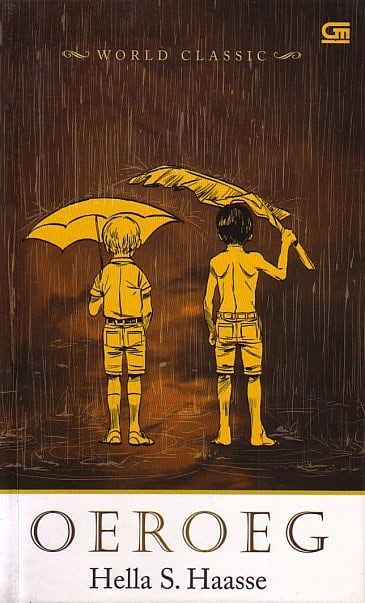
- Oeroeg
- Published by: Querido
- Level: Intermediate
- First Published in: 1948
Two friends living in Dutch colonial West Java, a Dutch boy and a native local, are torn apart by the march of history and Indonesia's fight for independence.
Hella Serafia Haasse was born in 1918 in Batavia, in what is now Jakarta (formerly part of the Dutch Indies). She moved to the Netherlands when her mother fell ill, but moved back to Batavia in 1928. After high school she decided to study Scandinavian Languages and Literature in Amsterdam. She is famous for her novels, poetry, essays, and travel experiences, and Oeroeg, her second novel, earned her public recognition.
The events described in the book are written as a flashback. Set in the 40s and 50s in the Dutch Indies (now Indonesia), the novel describes a friendship between two boys from completely different backgrounds. When they are young, their linguistic and cultural differences do not matter to them, but later on, as these contrasts grow more obvious, the boys are driven apart.
"Hella Serafia Haasse is famous for her novels, poetry, essays, and travel experiences, and Oeroeg, her second novel, earned her public recognition."
The narrator was born in the Dutch Indies, on the premises of the Kebon Djati company, where his father acted as administrator. His best friend, Oeroeg, was born there as well. He is a Sundanese boy, and along with the narrator, he plays in the company garden. When the narrator turns six, he has to go to school, and his parents tell him that he needs to learn how to speak proper Dutch, as his language is full of Sundanese words and slang. Oeroeg, on the other hand, is a native boy and is therefore not allowed to go to school. When his father dies, the narrator’s father feels sorry for the Sundanese boy and lets him attend school, but not the same one as his son. For his Dutch lessons, the narrator is especially tutored by Mr. Bollinger, and after a while, the narrator’s mother and Mr. Bollinger begin a relationship, which soon means that the narrator’s parents divorce. He doesn’t seem to mind, as he was never very comfortable around them. He felt more at ease with Oeroeg and his mother Sidris.

When his father goes away on a trip, the narrator stays with Lida, who owns a small pension. She hears from the headmaster at the narrator’s school that the young Dutch boy is away from school a lot, since he visits Oeroeg. So, Oeroeg moves in with the narrator and Lida. She is very concerned about the Sundanese boy and starts to see him as a kind of foster child. After primary school, the narrator enters a boarding school while Oeroeg stays with Lida. Meanwhile, the narrator’s father returns with another woman, and Lida and Oeroeg move to the city where Oeroeg is studying. When Oeroeg hits puberty, Lida decides to let him attend the same boarding school as the narrator, but there, both boys drift apart. After high school, they go to different universities. The narrator moves to Delft, in the Netherlands, while Oeroeg studies medicine. When the boys meet for the last time, before the narrator migrates to the Netherlands, it’s revealed that Oeroeg has become a militant in Indonesia’s fight for independence. Oeroeg tells the narrator that he doesn’t need his help anymore, and the narrator does not understand.
The book is written in Dutch. As the book was published in 1948, the language is old-fashioned. Words and sentences are very formal, whereas today, modern speech and writing is less formal and some of the words used by Haasse are no longer employed. The simple language is sometimes sprinkled with Indonesian words, as illustrated by the following sentence: “The babu had me put on one of my school uniforms.”

